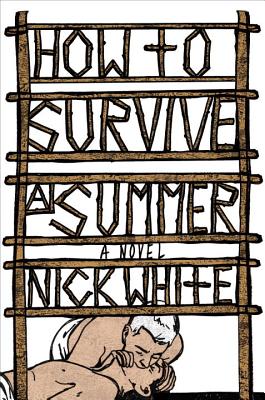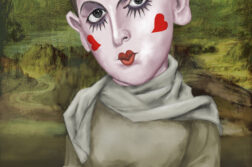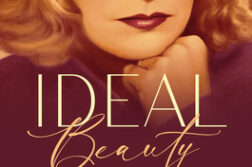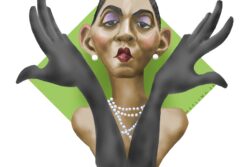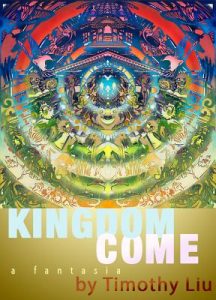 Kingdom Come: A Fantasia
Kingdom Come: A Fantasia
by Timothy Liu
Talisman House. 150 pages, $19.95
It’s difficult to classify Timothy Liu’s latest book, Kingdom Come. Liu is best known for his poetry, having published ten books of poems, from Vox Angelica (1992) to his most recent, Don’t Go Back to Sleep (2014). Kingdom Come, his latest, is a something of hybrid. It’s divided into four sections, most of which consist of a kind of dialogue between the narrator and his lovers. In the first section, “The Messages You Saved,” a former patient leaves a series of 26 elaborate voicemail messages with his ex-therapist. The messages carry a sense of the patient’s progressive desperation as he semi-jokingly refers to himself as a stalker. They’re rife with sexual obsession: in one, he describes a violent, kinky encounter he had with an older man, a church organist, when he was technically underage. In another, he phones the elusive therapist in the throes of masturbatory ecstasy and begs his father figure to “fuck me to kingdom come.”
The book’s “Hall of Mirrors” section comes close to prose poetry, offering a series of short, hermetic pieces, almost like fables, each one full of vivid imagery. The narrator’s sense of panic peaks in the last section, “Songs for Going Under.” In a series of short, incantatory paragraphs, he dives deeply into his mother’s life story, eventually assuming her voice and identity. “A Fantasia” is an appropriate subtitle for this hypnotic and mysterious book.
Jim Nawrocki
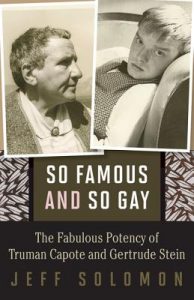 So Famous and So Gay: The Fabulous
So Famous and So Gay: The Fabulous
Potency of Truman Capote and Gertrude Stein
by Jeff Solomon
Minnesota. 288 pages, $27.
In So Famous and So Gay, literary critic Jeff Solomon explores the celebrity and mass market success of Truman Capote and Gertrude Stein to ask the question: How were these openly gay authors able to profit and flourish despite homophobia? Solomon concludes that both writers possessed a “fabulous potency”—a “broadly queer” appeal that exceeded the “specifically gay” features of their personæ and works. Simply taking up these two authors together makes for a queer pairing, notes Solomon: the canonical Stein, a looming masculine figure of the lesbian modernist avant-garde known for her convoluted prose, and the effeminate Capote, known as much for his public persona as for his writing. The concept of “fabulous potency” is an unlikely conjunction of gendered descriptors. By modifying the masculine virility of “potency” with the feminine-leaning “fabulous,” Solomon gets at something of the cross-gendered appeal of Capote and Stein, both celebrities who were “talked about more than read.”
This book is useful to gay and lesbian literary studies for its revival of Capote and its reframing of Stein through her most accessible works. Also valuable is its method of “homosexual reading,” which teases out the homosexual content of the two writers that sits on the surface of their texts like a butch at the bar, flagging notice. This is a book about gayness overlooked and gay lives lovingly, materially recovered.
Gino Conti
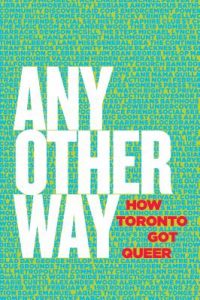 Any Other Way: How Toronto Got Queer
Any Other Way: How Toronto Got Queer
Edited by Stephanie Chambers, et al.
Coach House Books. 368 pages, $19.95
In Toronto’s Gay Village there is a larger-than-life bronze statue, unveiled in 2005, of Alexander Wood (1772–1844), a Scottish-born magistrate and merchant. He was involved in a scandalous “sex crime” in 1810, when he was accused of overly thorough physical examinations of several men who had molested a woman. Taunted as “Molly Wood,” he fled back to Scotland for a few years but later returned to Canada, resuming his professional career and buying property that became known as “Molly Wood’s Bush.” Wood represents the oldest subject in this anthology, but there’s no real order, whether chronological or topical, to the massive number of essays, ranging in length from a few paragraphs to several pages. This is a deliberate choice by the many editors of this self-described “eclectic mix.” The contributors include playwright-director Sky Gilbert; Jamaican-Canadian writer Makeda Silvera; and the founder of Glad Day Bookshop in Toronto, Jearld Moldenhauer. Several contributors chose to write about the African-American R&B singer Jackie Shane, a resident of Toronto and a nightclub performer whose early 1960s hit single “Any Other Way” provided the title of this book.
Martha E. Stone
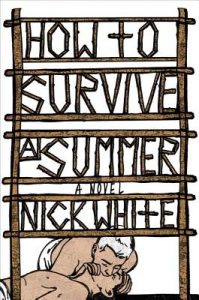 How to Survive a Summer: A Novel
How to Survive a Summer: A Novel
by Nick White
Blue Rider Press. 348 pages, $26.
Inspired by a film he has seen, narrator Will Dillard decides to take an interstate trip to revisit the camp where he endured four weeks of gay conversion therapy some years ago. Hoping to find closure and relief from the trauma he still endures, he also grudgingly meets his estranged father and two of the five campers he met at age fifteen. Of course, all were indelibly affected by that summer in central Mississippi. Dillard weaves this journey with his own recollections of that summer and earlier teen years when he failed to fulfill his Baptist preacher father’s expectations of masculinity. Strong parallels exist between White and Dillard’s lives, and the novel often reads more like a memoir due to White’s closeness to the main character. The advantage is White’s ability to produce a convincing depiction of Dillard’s trauma, the camp, and its leaders. Fear tactics, solitary confinement, and sadistic games were all part of the camp’s approach. Camp leaders clearly had their own unfinished battles with same-sex desire. This book serves as a reminder that this form of “therapy” is still practiced in the U.S., offering the false promise, still appealing to some teenagers and parents, that these ad hoc tortures can turn a gay person straight.
Jayson Morrison
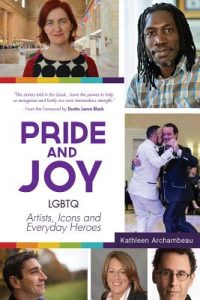 Pride and Joy: LGBTQ Artists, Icons and Everyday Heroes
Pride and Joy: LGBTQ Artists, Icons and Everyday Heroes
by Kathleen Archambeau
Mango Publishing Group. 322 pages, $16.95
Since his inauguration, Donald Trump has surrounded himself with shady figures fixated on pushing “religious freedom” as a means of suppressing LGBT rights. Over the summer Trump announced a ban on trans people entering the military. Coming against this backdrop, Pride and Joy is a refreshing reprieve. Kathleen Archambeau’s study profiles thirty individuals who represent the full spectrum of the LGBT rainbow. Each subject comes across as a complex person and not just a checked box. The profiles range from famous people like playwright Tony Kushner to lesser-known but still inspiring people like Sidney Grant, the founder of Ballroom Basix, an arts education program in New York City. In these compact profiles, Archambeau discusses how the subjects’ sexual identity shaped their life experience, and how in turn this experience informed their art or activism. The book would be especially appropriate for teenage readers in search of gay role models. For those of us who are weary or alarmed over the state of the nation, it can serve as a reminder of where the LGBT community has been and how far we’ve come.
Dan Calhoun
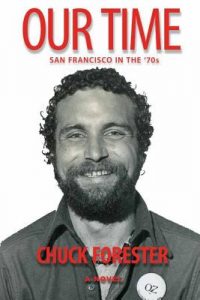 Our Time: San Francisco in the ‘70s
Our Time: San Francisco in the ‘70s
by Chuck Forester
Querelle Press. 159 pages, $19.97
Longtime LGBT activist Chuck Forester has had an admirable career. He served in the administrations of three San Francisco mayors, was an executive with many nonprofits (including the Human Rights Campaign), and led the effort to raise $3.5 million for the San Francisco Public Library’s Hormel Gay and Lesbian Center. Our Time is clearly autobiographical, but he has chosen, perhaps unwisely, to frame it as a novel.
The narrative focuses on Paul, a young Midwesterner who journeys to San Francisco, the gay mecca of the early 1970s, to start a new life. This is a young-man-from-the-provinces novel, replete with many “gee whiz” moments of improbable luck and fortuitous encounters. Handsome Paul has no problem finding sex, but what he really wants, of course, is true love. When he’s not looking for that, he’s busy with his quest to assemble a collection of LGBT literature that will give gay men and lesbians a sense of their history and “help start the revolution.” He eventually houses the library in a storefront financed by a wealthy friend. The novel concludes with a bizarre, raucous opening ceremony during which a huge crowd breaks into an impromptu rendition of “Over the Rainbow,” leaving everyone in tears. If it sounds corny, it is. I would have preferred to read Forester’s own, nonfiction take on the history he has witnessed and the contributions he has made.
Jim Nawrocki


